MEPs call for immediate action against Georgian Dream in European Parliament debate
MEPs call for action against Georgian Dream
On December 17, during a European Parliament debate, hearings were held on the ongoing protests in Georgia, with some MEPs calling for strong measures against the Georgian Dream ruling party.
The Vice President of the European Commission for Democracy and Demography, Dubravka Šuica, addressed the session, discussing the protests in Georgia that followed Prime Minister Irakli Kobakhidze‘s statement suspending the country’s EU accession process until 2028. According to Šuica, this move marks a clear departure from the policies of previous Georgian governments and the aspirations of the majority of the Georgian people.
“This is also the first instance where a country granted candidate status openly rejects its European path,” Šuica emphasized.
Eurosceptic and pro-Russian MEPs from the Georgian Dream allied groups took a different stance.
For example, Thierry Marian, a French representative from the right-wing party, stated that the European Union simply does not accept the will of the people in Georgia and Romania.
Meanwhile, Italian pro-Russian MEP Danilo Della Valle called on the European Parliament to acknowledge that Georgians are voting differently from what EU High Representative for Foreign Affairs and Security Policy, Kaja Kallas, and European Commission President Ursula von der Leyen would prefer.
MEP’s statements
Комментарии депутатов Европарламента
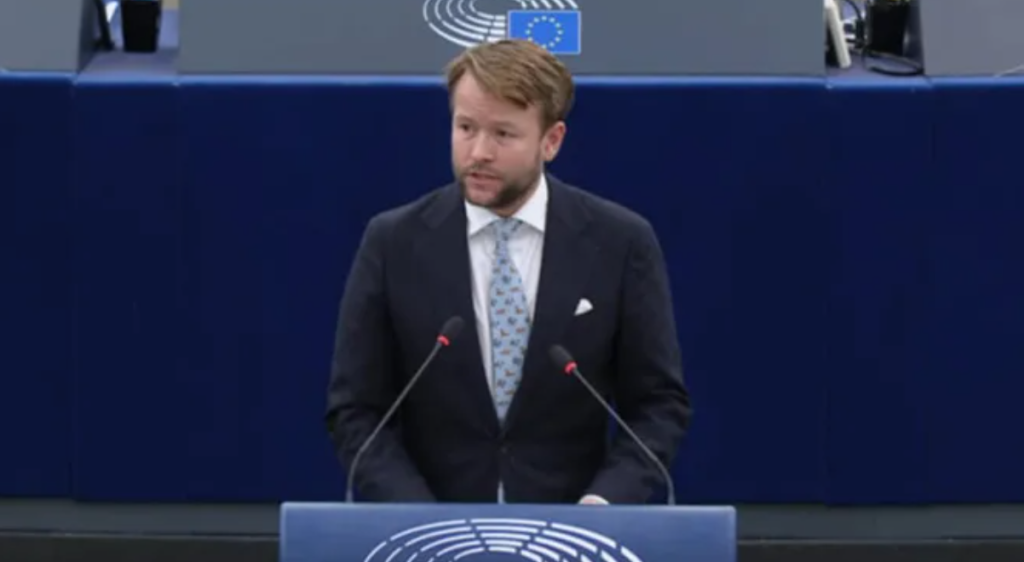
Reinier van Lanschot, a Member of the European Parliament from the Netherlands, said: “‘Georgian Dream’ has turned into a ‘Russian nightmare,’ with its leaders stealing people’s votes, stealing their hope, and blocking their path to the European Union. They are illegitimate and unconstitutional, but the masks have been removed and their true face revealed. A face all too familiar to the Georgian people—the face of Russian oppression.
Seven percent of Georgia’s population takes to the streets every day in protest. I’ve attended these rallies, where people are demanding new elections. A year ago, Georgia earned its EU candidate status not because of its government, but because of its people. And this people expects action from us today. So how can we help them? Impose sanctions on the leaders of ‘Georgian Dream,’ who only care about their own wealth. Fund independent media and democracy defenders, and support Salome Zourabichvili—the people’s president and legitimate leader.”
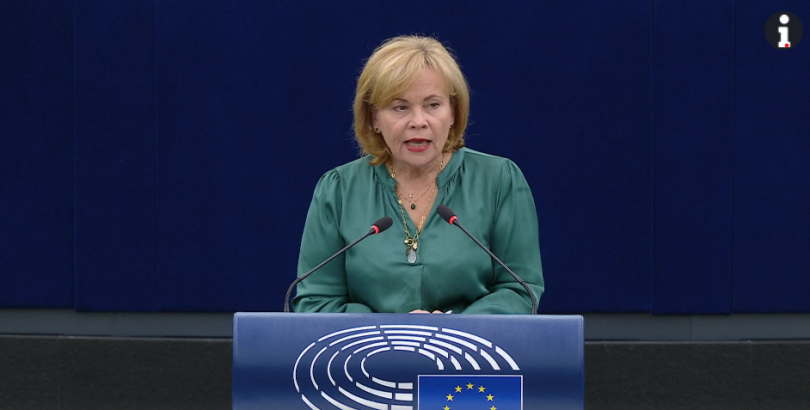
Rasa Juknevičienė, a Member of the European Parliament from Lithuania, said: “Is there hope?”—this is the question most often asked in Lithuania about Georgia. Yes, there is hope! Last week, when I was in Tbilisi, I saw many people with EU flags. Not only in Tbilisi but across Georgia, including in small villages.
Around 500 people have been arrested, hundreds beaten, including journalists, but more and more people are joining the protests. Georgia is becoming a clear example of how Russia’s influence can turn a democratic system into an authoritarian regime without war.
But Georgia is a candidate country, and EU institutions cannot stand by. My group’s position is clear: the parliamentary elections were stolen, and we see no other way to help Georgia but through new elections.
Zourabichvili is the only legitimate president, elected by the people. We call on EU member states to impose sanctions on those responsible for election fraud and violence against peaceful protesters. We urge heads of state and ministers to immediately travel to Tbilisi with a European and Georgian mission.”
I call on the EU not to allow Putin and his proxies to win the fight against freedom and democracy on the European continent.
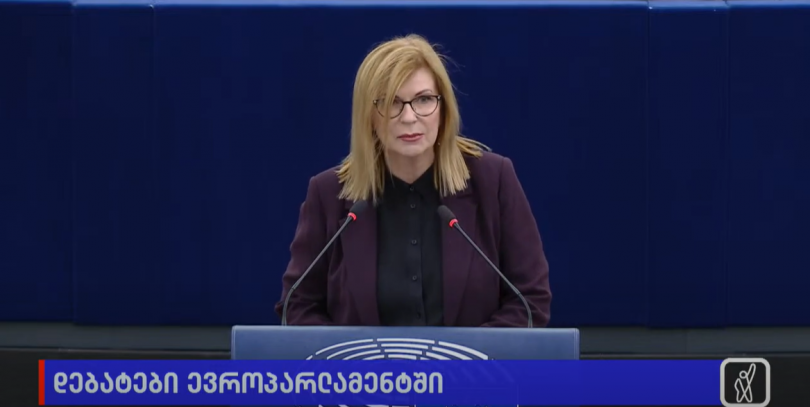
Malgorzata Gosiewska, Member of the European Parliament from Poland: “Thousands of Georgians have been taking to the streets for weeks, fighting against the policies of ‘Georgian Dream.’ They are fighting against a pro-Russian party that, openly, is leading the country toward Russia. Arrests, violence, the freezing of relations with the European Union – this is the government’s response to Georgian society. The slogan of the protests is ‘Wake up, Georgia!’ I would say the same – wake up Europe and stand with the protesters.”
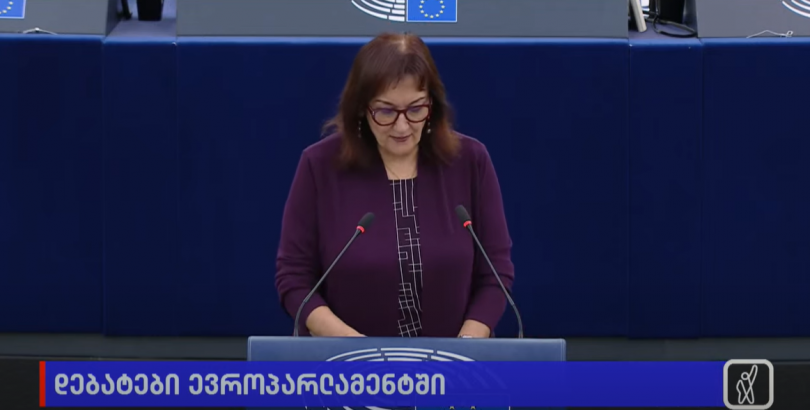
Dubravka Šuica, Vice President of the European Parliament, Croatia: Nearly three weeks have passed, and the Georgian people have been protesting across the country to defend their democratic and European future.
The situation in Georgia is worsening: over the past two weeks, more than 450 people have been detained. Around 300 people have been subjected to violence and mistreatment, with many requiring urgent medical attention. Law enforcement has pressed administrative charges against over 400 people, while approximately 30 individuals face criminal prosecution, yet no police officers or members of informal violent groups have been held accountable for abuse of power.
These events are not isolated incidents but are part of a broader picture of democratic regression in Georgia. Prior to the parliamentary elections on October 26, there were significant violations that contradicted European norms and values. In June, we responded with several measures, including the reduction of political contacts and the suspension of aid: 30 million euros from the European Peace Fund and 121 million euros in direct aid to the government were frozen.
Georgia’s success process has essentially been halted. The authorities have not changed their course. Honorable members of parliament, it is time for decisive and united action from the European Union. This is what the Georgian people expect from us. Those responsible for the violence must be held accountable, the authorities must immediately stop the repression, release the unlawfully detained protesters, and resume the integration process.
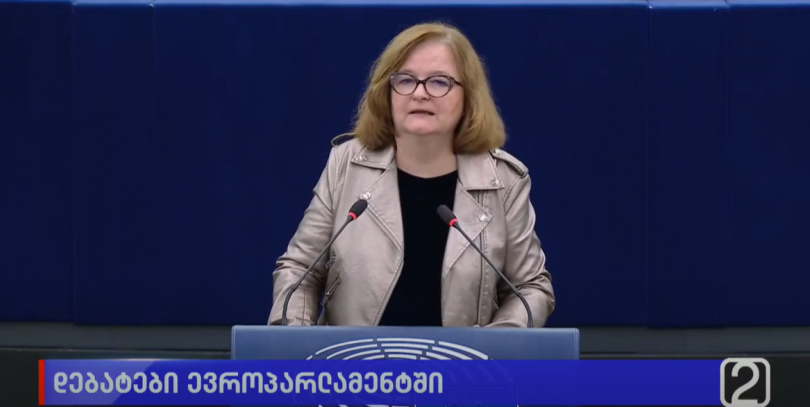
Nathalie Loiseau, Member of the European Parliament from France:
Dear colleagues, have we become deaf and no longer hear what the protesters in Georgia have been saying for so many days? I will tell you, I met with them – the elections were stolen, as was their future and freedom – their dreams. “Georgian Dream” keeps repeating that Georgia is Europe, not Russia. However, we see repression against peaceful protesters, beatings of journalists, and arrests of opposition figures.
We see dark clouds gathering over the country, and can we really not help them and stop the “Dream”? Madam Zourabichvili is fighting for her country’s democratic future. Georgia’s place is in the family of European democracies, and Salome Zourabichvili will speak about this in the plenary. We must prove that they are not relying on us in vain.



















